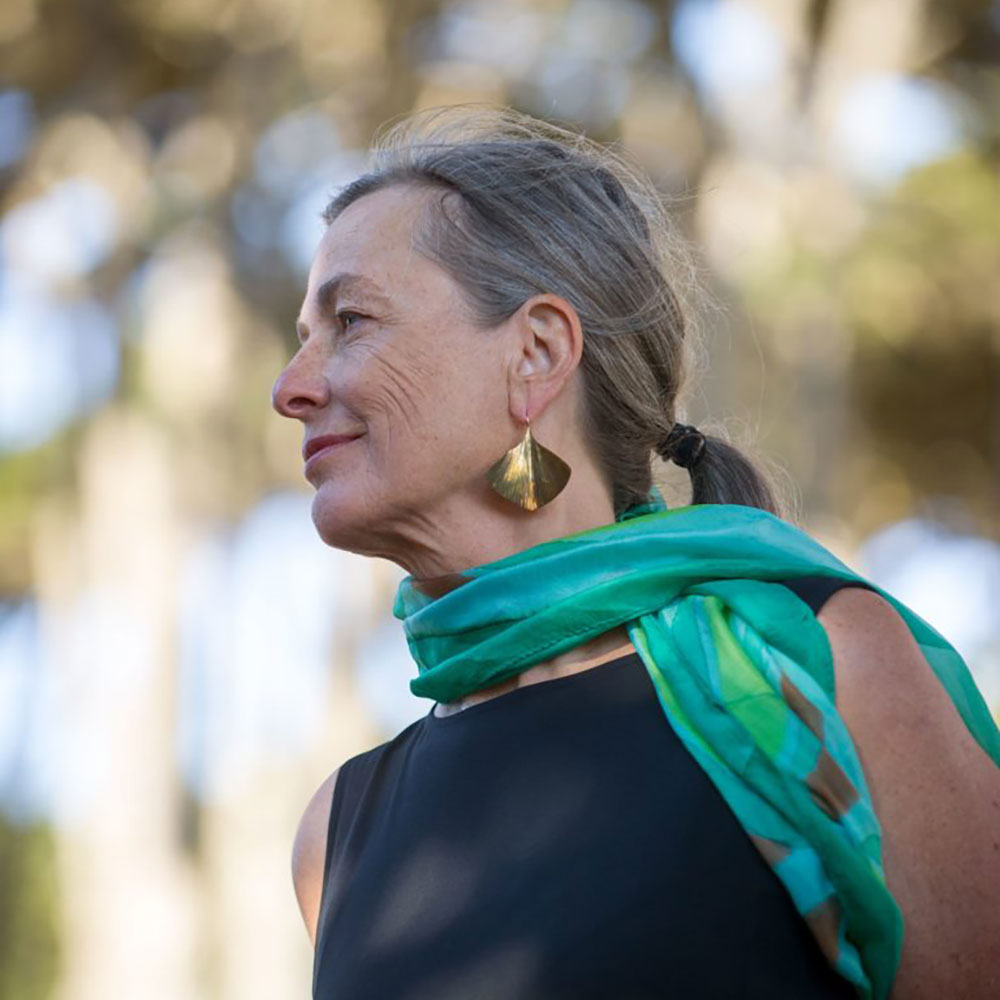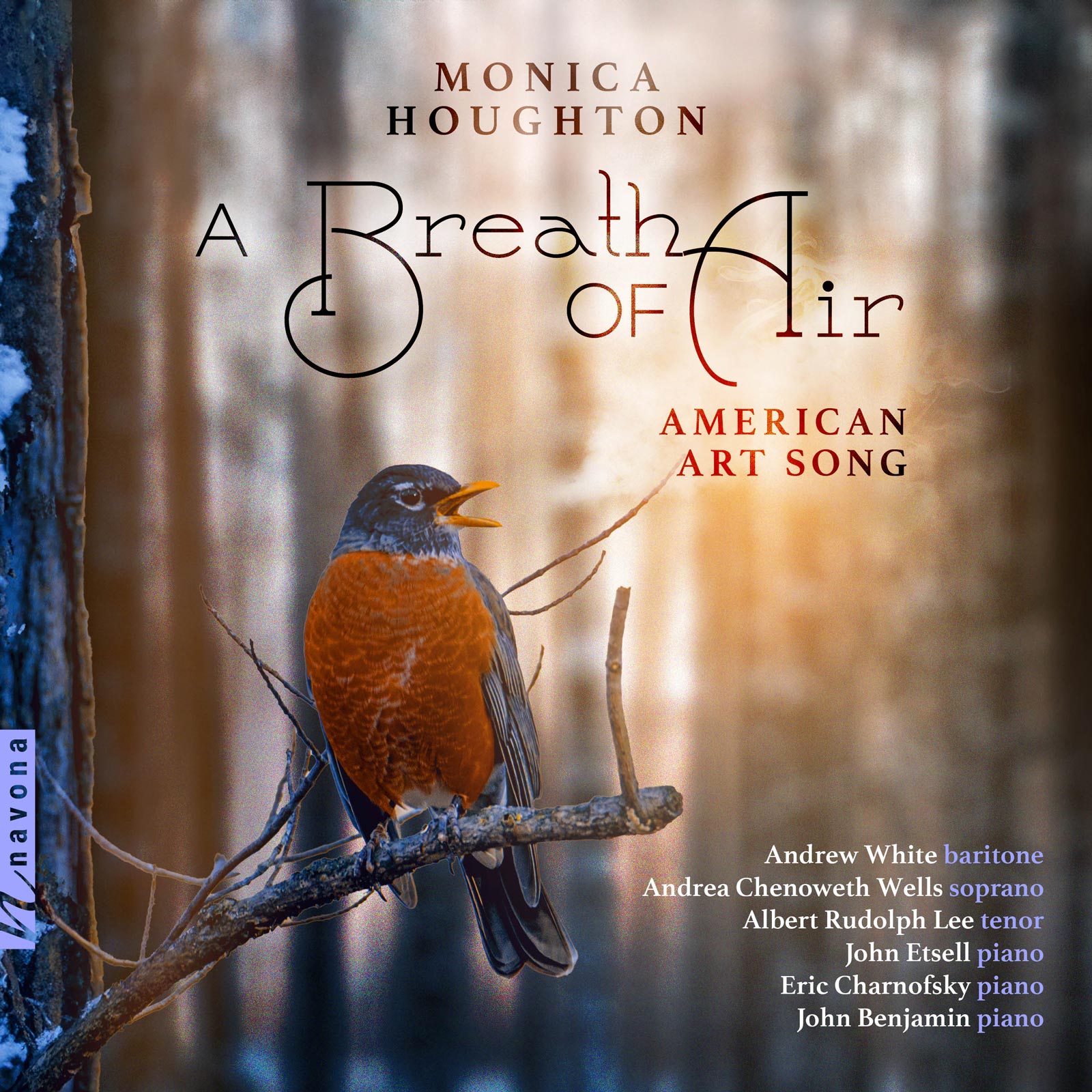
A love of poetry lies at the core of Monica Houghton’s A BREATH OF AIR from Navona Records. She has set to music not only lyrical giants such as Whitman, Dickinson, and Hughes, but also some contemporary poets with their own magnificent lyrical gifts. These soul-touching works are performed to the highest possible standard by select world-class singers and accompanists. A perfect symbiosis on all fronts.
Today, Monica is our featured artist on the “Inside Story,” a blog series exploring the inner workings and personalities of our composers and performers. Read on to learn extensive library of compositions and her interest in the ways that music can bring people together…
Tell us about your first performance.
Hearing Frank Wiley conduct a reading of my first orchestra piece with the student orchestra at Kent State University where I was enrolled in a graduate seminar in the early 1990s, was a transcendent experience — comparable let’s say to a first kiss!
Although I had heard some performances of several of my own compositions before that day, the rich and complex sounds coming from the orchestra, despite my knowing ahead of time what I had written down in the parts, was astonishing, and I will never forget it.
If you could collaborate with anyone, who would it be?
Alice Goodman, the poet and librettist. After spending many years laboring to finish my one and only opera, The Big Bonanza — and having seen it through to a full production eventually at the University of Nevada, Reno — I swore to myself that I would never undertake to write another opera unless it was by commission, and with a professional librettist. I admire very much Alice Goodman’s bold libretti, with their potent mix of poetry and philosophy — to me she is an icon.
Take us on a walk through your musical library.
In my library at home are found many volumes of music composed by great composers, and I often refer to them for instruction. I respect greatly the tradition from which my creative life has sprung.
At the same time, I’m always on the lookout for new ideas. Sometimes I am influenced by outside events, images, texts, or particular experiences, like a live performance, a walk in the mountains, an idea or a word, because almost anything could kindle a new composition!
Up to this point in time, I have composed more than 100 serious concert works, including more than a dozen orchestral and large ensemble works, choral works, an opera, a large number of chamber works, art songs and vocal chamber music, as well as solo works for many different instruments. I have experimented with a wide variety of styles and genres, and often enjoy the freshness of a new adventure.
What emotions do you hope listeners will experience after hearing your work?
I just hope listeners will feel something that lingers, something that in some small way transforms their perceptions, something to take with them as a souvenir from their time spent listening to my music. Perhaps it will be a feeling, or an image, something that feels real and true.
Of course the experience of listening in and of itself could be pleasurable, interesting, perhaps entertaining, but I hope to achieve more than those things through my music, even to share some insight into the human condition.
How have your influences changed as you grow as a musician?
I studied piano seriously for quite a few years before beginning to compose music of my own, and I was most influenced from the inside, by the music I learned at the keyboard. I also loved poetry and developed an interest in art song. Some of my first compositions were settings of texts. In fact, making the transition to composing purely instrumental chamber music required some effort on my part, and in pursuit of that next step, I arranged to spend a summer at the Marlboro Music Festival in Vermont, eavesdropping on rehearsals.
The experiences of hearing such excellent performances there, and from the Cleveland Orchestra where I volunteered as an usher for nearly a decade, both had a profound effect on my composing. These were the sounds I carried with me in my ears, and this was the standard to which I aspired. The sonic possibilities of different instruments and combinations of instruments remain fascinating to me, and even though feeling per se is paramount in music, form is yet another important and related aspect, one with which I am preoccupied increasingly. These days, more and more, too, I am interested in the ways that music can bring people together.
What musical mentor had the greatest impact on your artistic journey? Is there any wisdom they’ve imparted onto you that still resonates today?
My first teacher was the late Mary Ann Griebling of Akron OH. After just a few lessons with her she announced to me that I was talented, and that one day people would want to come to hear concerts featuring my music. I was very skeptical… but she was right.
A bit later I took some lessons with Dennis Eberhard and he told me not to be envious of what other composers do, but to simply do what YOU can do. There have been so many wonderful people who have supported and encouraged me — friends, fellow composers, and performers who have championed my work. It’s so true what they say, that it takes a village to educate a child, and this applies to composers, too.

Monica (Niki) Houghton was born in Vermont and raised in northern Nevada. She holds A.B. and A.M. degrees from Harvard University in Chinese Language and Literature and East Asian Studies. She earned an M.M. in Composition from the Cleveland Institute of Music in 2003 and served as Instructor for their Joint Music Program with Case Western Reserve University for nine years before moving back to Nevada in 2011.

